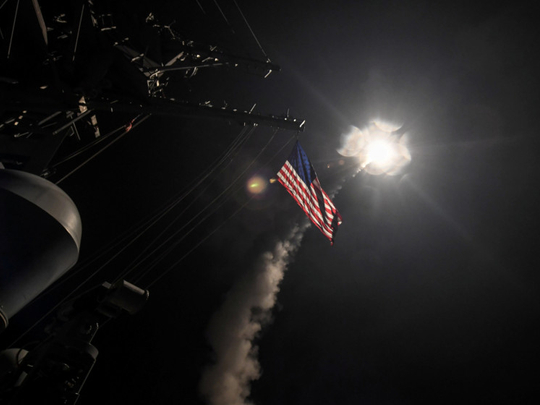
Over the last week pundits both in America and overseas have taken positions for and against US President Donald Trump’s decision to attack a Syrian airbase. The striking thing about much of this commentary has been the certainty it projects. Before the missile strike Trump said the use of chemical weapons in Khan Shaikhoun — or, more precisely, the disturbing television images of dead and dying children in the wake of the chemical attack — had altered his views on Syria and the government of Bashar Al Assad. After the missile strike, the message seemed clear: gone is the policy of keeping out of Syria’s civil war except to fight Daesh (the self-proclaimed Islamic State of Iraq and the Levant). Back is America’s view of itself as a global policeman.
The problem with this theory is that it presumes policy coherence in an administration that, until last week, was thought to lack this very quality. Only ten days ago the Trump administration was saying it did not much care whether Al Assad stays or goes. It now seems dedicated to his ouster. It might be comforting to see this change as evidence of a new seriousness of purpose in Washington. But isn’t it just as easy to argue that Friday morning’s missile strikes were an emotionally-driven reaction to the crisis of the moment?
In domestic affairs it has long been clear that Trump holds few fixed views, cares little for detail or nuance and tends to react to any given situation by doing or saying whatever he thinks will boost his immediate popularity and shore up his always-fragile ego. Why should anyone believe he would act differently in foreign affairs, even in matters as grave as war and peace?
Viewed this way the danger is not that the US is suddenly about to plunge into Syria. It is that American policy is essentially episodic; drifting quietly toward ever-greater military involvement in the region without any clear view of what that involvement is supposed to achieve.
The idea that Washington might be making up its Syria policy as it goes along was reinforced on Sunday morning. In an interview with CNN Trump’s UN Ambassador, Nikki Haley, repeated that “we don’t see a peaceful Syria with Al Assad in there” and said further military action might be taken if Trump decides it is necessary.
At almost exactly the same moment this was broadcast, Haley’s nominal boss, Secretary of State Rex Tillerson, was assuring viewers of ABC News that America’s priority is Daesh, that the missile strike on the airbase was a one-time event and that Al Assad’s fate is not America’s to decide.
Worrisome
Mixed messages like these are especially worrisome because if there has been one clear trend in the Trump administration’s approach to the Middle East, it has been to deepen the US military’s involvement in almost every conflict across the region while also explicitly raising its profile. During the last years of the Obama administration, it was hardly a secret that the US had hundreds of troops in Syria and Iraq and regularly launched drone strikes and special forces raids into Yemen. But the White House and Pentagon wanted these activities to generate as little publicity as possible. The Trump administration clearly wants the world to know that Americans are on the ground across the region even if, for security reasons, it is often less forthcoming about what they are actually doing.
Yet involvement creates expectations. Exposure in the sense of publicity can create exposure in the sense of danger. And if today’s modest deployments do not create the ‘win’ the president desires, it is remarkably easy to rationalise ever-greater numbers of ‘boots on the ground’ one small step at a time. In a thoughtful interview with The Atlantic last summer, Obama spoke of his wariness of the notion that America’s most important source of power is its global ”credibility”. Conventional wisdom, he said, usually holds that maintaining credibility requires the use of military force. It is a mindset that makes it hard to step back from confrontation or escalation once the country is committed, even in a small way. That, in turn, makes America’s growing military (and shrinking diplomatic) footprint around the region especially dangerous.
So the real issue is not that last week’s raid may mark a shift in Syria policy or prove to be, in one CNN pundit’s phrase, “a major clarifying moment” for the Trump administration. It is: what will the Trump administration do next? Especially if Russia or the Al Assad government or both do not react in exactly the way Washington wants?
Will reaction, or another provocation, lead inexorably to escalation? If a few hundred troops are threatened or become targets, will the solution be to increase their numbers to a few thousand — and so on, and so on? The question that needs to be asked when planning any military or diplomatic confrontation is: and then, what? Right now there is not much evidence that Washington has an answer.
Gordon Robison, a longtime Middle East journalist and US political analyst, teaches political science at the University of Vermont.








